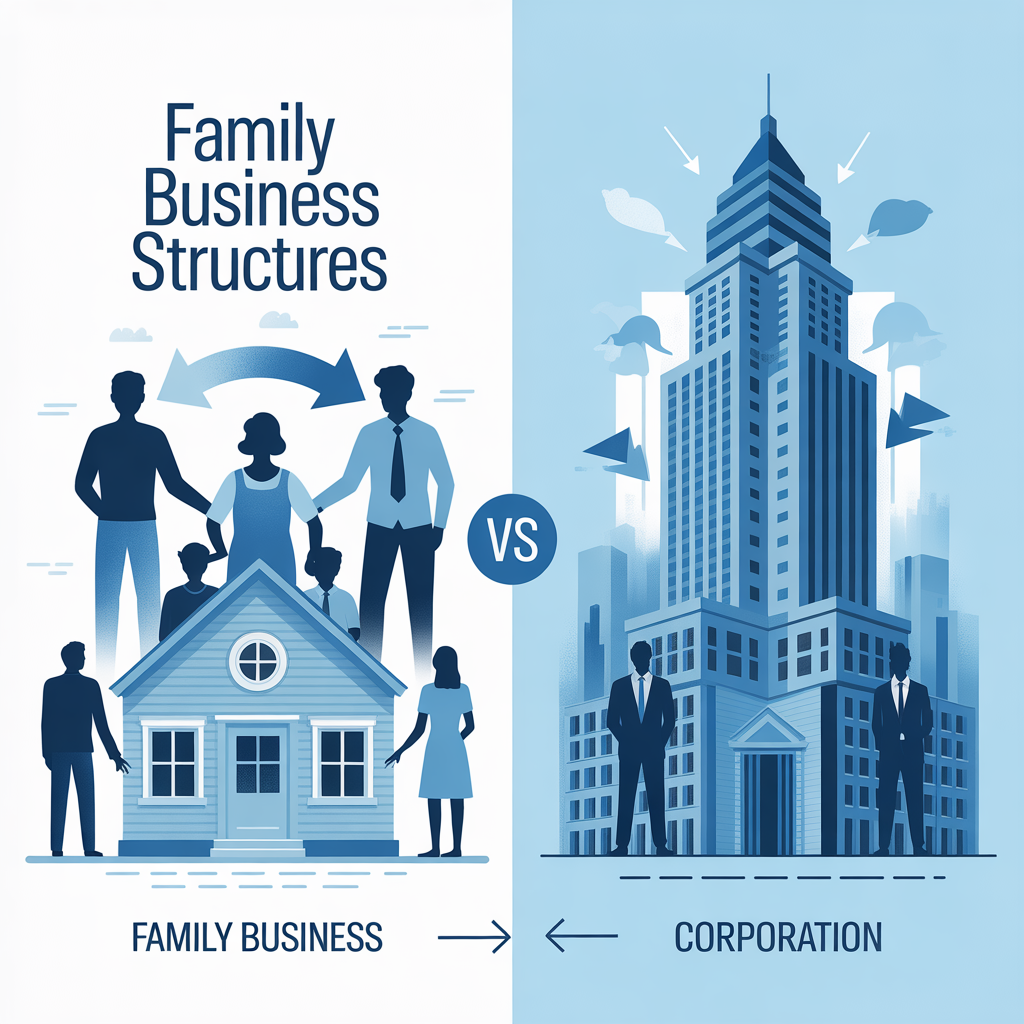When starting a new company, one of the first big questions is:
Should you structure it as a family business or a corporation?
Both models can be profitable and successful — but they differ in ownership, management, taxes, and long-term goals.
At Rocket Bookkeeper, we help business owners understand these differences so they can make smart financial and structural decisions for long-term growth.
What’s the Difference Between a Family Business and a Corporation?
A family business is owned and managed by family members who share both personal and business goals.
A corporation, on the other hand, is a separate legal entity owned by shareholders and managed by a board of directors, with decisions made to maximize profitability and shareholder value.
Understanding these distinctions helps you make better decisions about succession planning, taxes, and growth strategy — three key areas where structure matters most.
What Is a Family Business?
A family business is more than just relatives working together. It’s a company where two or more family members are actively involved in ownership and management — often across multiple generations.
One family member usually holds majority control and key decision-making power. Family businesses tend to prioritize long-term stability and maintaining family values over short-term profits.
Common Types of Family Businesses
- Family-owned businesses: Family members own most or all of the business.
- Family-managed and owned: One person leads, but the entire family helps set goals.
- Family-led and owned: One owns the business, another helps steer it through board-level decisions.
What Is a Corporation?
A corporation is a legally separate entity from its owners. It can:
- Own property
- Sign contracts
- Pay taxes
- Borrow money
- Be sued or sue others
Corporations are designed to grow, attract investors, and operate on a large scale — which is why most major companies in the U.S. are incorporated.
Key Advantage:
Shareholders enjoy limited liability — meaning they aren’t personally responsible for company debts.
Main Types of Corporations
- C Corporation: Pays corporate taxes separately; profits distributed to shareholders are taxed again (double taxation).
- S Corporation: Avoids double taxation by passing profits/losses to shareholders’ personal tax returns (limited to 100 shareholders).
- Nonprofit Corporation: Focuses on charitable or educational purposes and is exempt from federal taxes.
Family Business vs. Corporation: Key Differences
1. Ownership and Control
- Family Business: Owned and run by family members; decisions often reflect family values and long-term goals.
- Corporation: Owned by shareholders and managed by a board; decisions are based on profitability and business performance.
2. Continuity and Succession
- Family Business: Leadership often passes between generations. Without a clear plan, transitions can become challenging.
- Corporation: Leadership changes smoothly due to established systems and professional management teams.
3. Size and Resources
- Family Business: Usually smaller with limited access to capital; decisions are more personal.
- Corporation: Larger with more funding options (stocks, bonds, investors) and greater scalability.
4. Management and Culture
- Family Business: Personal, hands-on management style. Close relationships and flexible policies are common.
- Corporation: Formal structure with clear job roles, HR policies, and performance-driven culture.
5. Decision-Making Process
- Family Business: Decisions are based on family interests, values, and long-term goals.
- Corporation: Decisions rely on data, market analysis, and the pursuit of profit and shareholder value.
Real-Life Examples
- Walmart – A classic family business, founded by Sam Walton and still influenced by the Walton family’s values and mission.
- Apple Inc. – A corporation, owned by shareholders and managed by professionals focused on innovation and profitability.
How Are Family Businesses Taxed?
Family businesses are taxed based on their legal structure:
- Sole Proprietorship or Partnership: Profits are reported on personal tax returns.
- LLC or Corporation: Taxed separately depending on chosen structure.
If you employ your children under 18 in a family business (not a corporation), their wages are exempt from Social Security, Medicare, and FUTA taxes — a valuable benefit for small family-run firms.
How Are Corporations Taxed?
Corporations are taxed as separate entities using IRS Form 1120.
They pay corporate tax on profits, and shareholders pay tax again on dividends — known as double taxation.
However, S Corporations avoid this by passing income directly to shareholders.
Corporations must also pay estimated taxes quarterly (April, June, September, December).
Which Is Better for You?
It depends on your goals:
| Goal | Best Option |
|---|---|
| Maintain family control | Family Business |
| Raise capital or expand nationwide | Corporation |
| Simplify taxes and management | S Corporation |
| Preserve legacy and flexibility | Family Business |
| Build investor confidence and public transparency | Corporation |
At Rocket Bookkeeper, we help small business owners choose the best structure, manage bookkeeping, and handle taxes — whether you’re growing a family business or forming a corporation.
The Bottom Line
Both family businesses and corporations can succeed — they just operate differently.
A family business keeps control close and values tradition, while a corporation focuses on growth, structure, and investor returns.
No matter which you choose, having a clear financial and tax strategy is essential.
That’s where Rocket Bookkeeper comes in — managing your bookkeeping, payroll, and tax compliance so you can focus on building your business confidently.
FAQs
1. Can a family business be a corporation?
Yes, many family businesses operate as S or C corporations for tax and liability benefits.
2. Which is more profitable — a family business or a corporation?
Corporations usually have higher growth potential, but family businesses often enjoy stability and long-term wealth.
3. How does leadership transfer differ?
Family businesses rely on generational succession; corporations use structured transitions through executives or boards.
4. Are family businesses taxed differently?
Yes, family businesses may enjoy certain tax exemptions — especially when hiring family members.
5. How can Rocket Bookkeeper help?
We manage your bookkeeping, tax filings, and payroll — helping both family businesses and corporations stay compliant and profitable.


